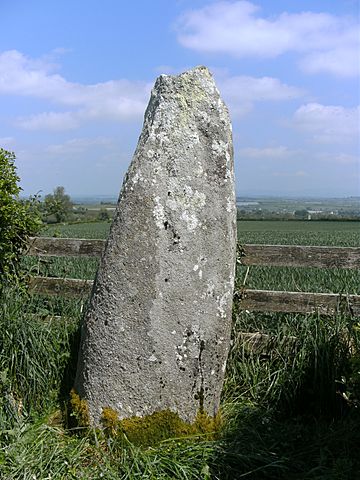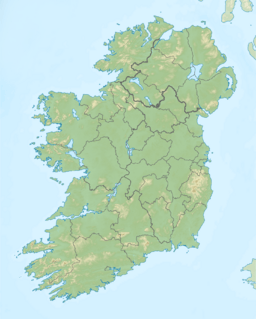Mullaghmast facts for kids
Quick facts for kids Mullamast |
|
|---|---|
| Mullach Maistín | |

Standing stone on Mullaghmast
|
|
| Highest point | |
| Elevation | 179 m (587 ft) |
| Naming | |
| English translation | Broad crown (summit) of Maistiu |
| Language of name | Irish language |
| Geography | |
| Location | County Kildare, Ireland |
| OSI/OSNI grid | S770961 |
Mullaghmast (Irish: Mullach Maistín), also spelled Mullamast, is a small hill in the south of County Kildare, Ireland. It's close to the village of Ballitore and near the borders of Wicklow, Laois, and Carlow. This place has been very important throughout history, from ancient times to more recent events. Today, it is recognized as a National Monument by the Irish government.
Contents
The Story Behind the Name
The name Mullaghmast comes from an old Irish collection of poems called the Metrical Dindshenchas. These poems explain how Irish places got their names. According to one story, Mullaghmast is named after a woman named Maistiu. She was the wife of a powerful man named Dáire Derg.
Ancient Stone and Kings
A special standing stone was found at Mullaghmast. This stone has a cool design called a triskele, which looks like three spirals joined together. Experts think this stone is from the very end of prehistoric times or the early Christian period. You can see it today at the National Museum of Ireland in Dublin.
Mullaghmast was also once the royal home for the Uí Muiredaig kings. These kings were part of a bigger group called the Uí Dúnlainge dynasty, who ruled the area of Leinster.
The 1578 Mullaghmast Gathering
A very sad event happened at Mullaghmast in 1578. At this time, there was a rebellion led by Rory O'More. His forces had even burned the town of Naas in 1577.
To try and make peace, an English leader named Sir Henry Sidney invited many Irish lords and their families to a meeting at Mullaghmast. These lords were from Laois and Offaly. They came hoping for a peaceful discussion.
However, it was a trap. When the Irish lords, their wives, children, and followers arrived, they were unarmed. Sir Henry Sidney left the gathering, and his soldiers then attacked the Irish people. Almost everyone was killed. It is believed that about 400 people died, including many from the O'More family. This event left the area without its local leaders and allowed the English to take more control of the land.
What the Old Records Say
The Annals of the Four Masters, which are old Irish historical records, describe this event:
- "A horrible and terrible act of betrayal was done by the English of Leinster and Meath against the people of Offaly and Leix who were allied with them. This is how it happened: they were all called to show themselves, with as many people as they could bring, at the great fort of Mullach-Maistean. When they arrived, they were surrounded by four lines of soldiers and horsemen, who began to shoot and kill them without mercy, so that not a single person escaped alive."
Local Sports Connection
The local sports club, St Laurence's GAA, is based in the area around Mullaghmast. This club brings together people from several nearby villages and townlands, including Kilmeade, Booley, Narraghmore, Calverstown, Kilgowan, Brewel, Ballymount, Ballitore, and Mullaghmast itself. They play traditional Irish sports like Gaelic football and hurling.
See also
 In Spanish: Mullaghmast para niños
In Spanish: Mullaghmast para niños
 | Kyle Baker |
 | Joseph Yoakum |
 | Laura Wheeler Waring |
 | Henry Ossawa Tanner |


